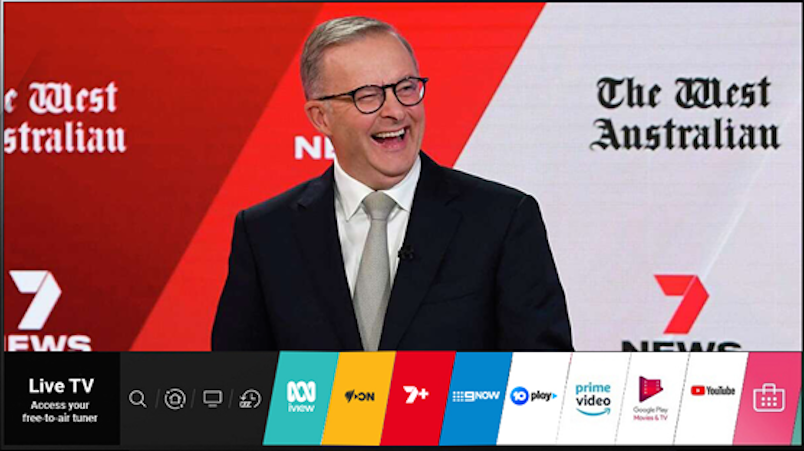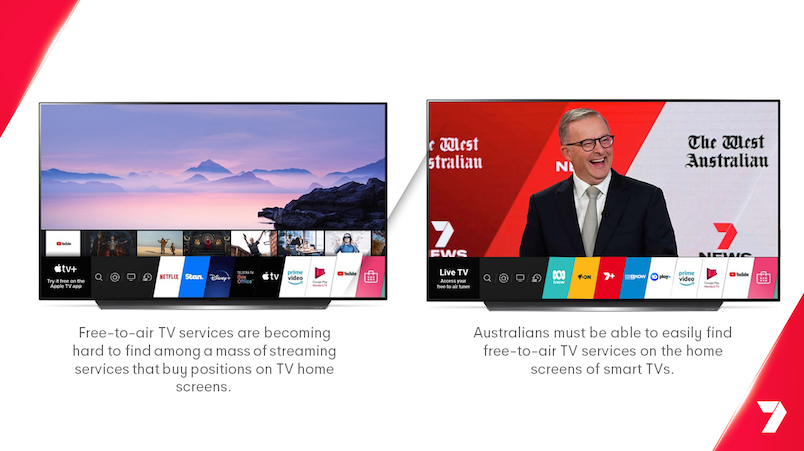Warburton: ‘One network’ blocking overnight ratings overhaul but TV sector unites for Labor to enshrine broadcaster CTV home screen dominance against streamers

Broadcasters want legislation in by year's end which ensures their apps on connected TV's have top prominance and are exempt from TV set manufacturers selling their home screen real estate to the highest bidder - usually streaming services.
Seven West CEO James Warburton has re-pitched plans to cull overnight ratings reporting but Nine is holding out, also opposing a trade-off proposal to report overnight metro, regional and BVOD numbers side by side. But the networks have united to urge the Albanese government to honour commitments made pre-election to review quotas, sports anti-siphoning and prominence – fearing streamers are paying to force them off connected TV home screen real estate and into obscurity.
What you need to know:
- Seven boss James Warburton again calling for cull on overnight ratings reports – urging a month long trial.
- Ten open, Nine not keen and cool on proposal to report regional, metro and BVOD numbers side by side.
- Networks all back call for Albanese government to honour pre-election commitment to overhaul anti-syphoning laws and enact 'prominenece' legislation – rules to stop the broadcasters being pushed off the home screens of smart TVs by higher spending competitors.
Let’s get rid of overnights, even for just a month, and start to tell the real story.
A year on from his foiled bid to have TV networks dump public overnight ratings reporting because they undercook total TV audiences, Seven’s CEO James Warburton has again called for the scrapping of published overnight ratings figures – and urged industry to try it.
“The challenge I put to my TV peers is: let’s get rid of overnights, even for just a month, and start to tell the real story,” said Warburton. “That’s what happens in the UK and the US where they focus on three days and seven days.”
The networks remain divided on Warburton's call to abolish public and press access to overnight numbers although there is no suggestion those feeds would halt to agencies and the TV networks. But they are united in demanding the new Labor government urgently legislates a mandate for connected TV manufacturers and streaming services to give priority and prominence on their home screens to free-to-air network apps and refrain from charging them huge fees.
Warburton is confident Labor will intervene to neutralise the threat of “cash-rich” streamers outbidding networks for ‘prominence’ on smart TVs, which per ThinkTV research now account for 56 per cent of television sets in Australia. He’s pushing for new legislation by the year-end. Nine and Ten backed that call alongside demands to review anti-siphoning laws to prevent sports codes selling directly to streaming platforms while seeking to shelve plans to force local quota rules onto streaming platforms.

Crowded house: How CTV home screens can look today, how Seven would like it to look under new prominence rules.
“There is no denying that finding content on connected TV sets is getting harder and harder,” said Warburton.
“The big multinational content companies are paying to get the best spots on the TV and the remote. Operating system providers are deciding how content is ordered and how it is served to viewers,” he added.
“The regulatory framework must be updated to ensure the prominence of commercial broadcast services.”
While united on the regulatory front, industry proposals backed by Seven and Ten to report overnight metro, regional and BVOD numbers side by side – a trade-off for culling traditional overnights – are being blocked by Nine.
OzTAM measures and reports on Metro TV and BVOD, RegTAM does the regional data. For the purposes of publicity, any network can add up those numbers and PR it for themselves. That is what they do today.
Political manoeuvres
Warburton re-pitched ditching overnight reporting to business leaders at an event hosted by the Committee for Economic Development of Australia (CEDA).
The Seven West CEO then urged Labor to honour its pre-election commitment to follow the UK’s lead in legislating to curb “the rise of gatekeepers”.
In a pre-election statement issued 7 May, Labor stated: “We will legislate a prominence regime to ensure Australian TV services can easily be found on connected TV platforms.” It also committed to a review of anti-siphoning: “We can’t afford to have our sporting heroes disappear onto costly subscription streaming services,” per the statement signed by Albanese, Don Farrell, now trade and tourism minister, and Michelle Rowland, now communications minister.
While lobbying government for swift action may pay off, scrapping overnight ratings reporting is squarely down to TV networks.
Ten was broadly supportive of Seven’s push last year – and remains unopposed – but Nine refused to commit, leading Warburton to publish an opinion-piece in Nine-owned Australian Financial Review.
Asked if Nine’s stance had softened, sales chief Michael Stephenson demurred, while questioning broader industry appetite to cull 24-hour ratings. He said overnights remain a crucial cog in the media reporting machine, pointing out that industry already has a seven-day consolidated figure. “We need to look at both [overnights and longer tail data],” said Stephenson. “We have been consistent with that stance. We look at everything from a total TV lens.”
Ten Sales chief Rod Prosser didn’t rule out a month-long overnight hiatus, though said any industry-wide initiative must come via panel data provider OzTAM.
As a trade-off, a plan has been tabled to report total overnight TV numbers across metro and regional free-to-air side by side with overnight BVOD figures. But Nine, which no longer has a regional affiliate, is opposed the move, which requires cross-network consensus.
“OzTAM measures and reports on Metro TV and BVOD, RegTAM does the regional data. For the purposes of publicity, any network can add up those numbers and PR it for themselves” said Nine’s Stephenson. “That is what they do today.”
Buyers perplexed
Either way, GroupM boss Aimee Buchanan was sceptical that the industry would scrap overnight reporting in the short-term.
“The big tent-pole events and live sport make it hard to walk away from [overnights]. Aggregating things like the NRL and AFL grand finals into a weekly summary? I can’t see that happening.”
“You can measure things like the AFL over a season, but if you’re buying the Grand Final, you want to know it has performed.”
Buchanan said moving to longer reporting periods also runs counter to the digital ad market, where buying and reporting windows are shortening. “But [moving away from overnights] is more likely as it rolls into a single audience across BVOD and broadcast – total TV – and that will probably give the flexibility needed.”
Omnicom Media Group investment chief Kristiaan Kroon said removing overnight data would pose a problem: “You would be messing with a key data input on how the system works from an advertiser perspective”. But he said an overnight communications halt could prove beneficial.
“It can be misleading – and [the networks’ overnight reporting] is not the numbers we talk to clients about,” said Kroon. “But the overnight data itself is a different story. We need that data.”
